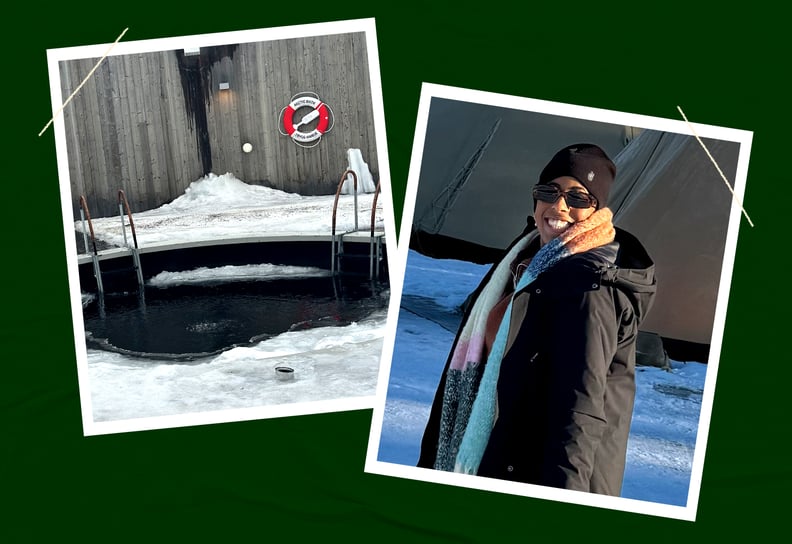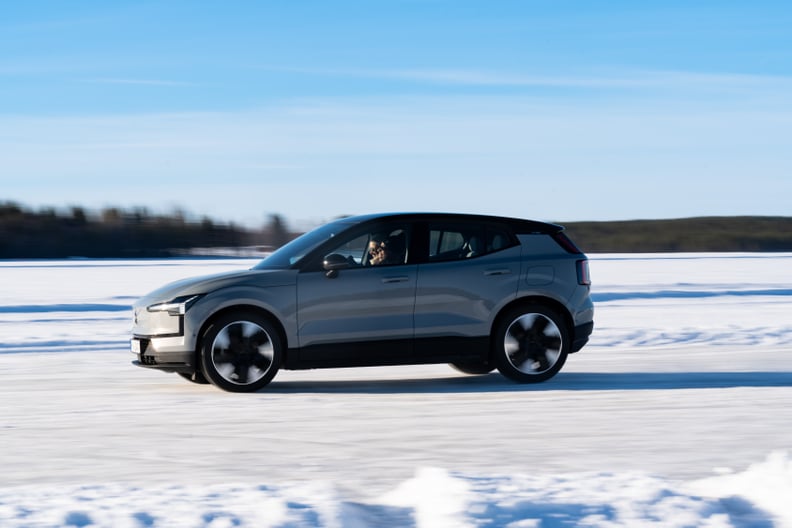
As a health editor, I get heaps of wellness pitches each day — most of which claim to offer the latest and greatest methods for a better, healthier you. Some of it works (like walking backwards) and some of it’s iffy (looking at you, sexy water).
Over the last few years, the theme I can’t seem to escape, however, is Scandinavian wellness. From trends like hygge and the Scandi sleep method to the ever-popular Nordic trend of cold plunging, Scandinavian wellness trends continue to be touted as elixirs for overall health and wellbeing.
When I got the opportunity to try a few out for myself in Sweden alongside Volvo, I jumped at the opportunity. The car brand is headquartered in Gothenburg and invited a few editors to test out some of the most popular Nordic health trends, as well as their first fully electric vehicle, the EX30, which is inspired by Scandinavian lifestyle and wellness.
Scandinavian culture prioritizes simplicity, alongside deep and meaningful connection to nature. It promotes several feel-good philosophies and rituals, all of which center on being slower, more mindful human beings. I spent four days in Sweden putting a few of them to the test and shared my honest thoughts below.
Gökotta
Prior to this trip, I thought my morning ritual was pretty decent: wake up, check my phone for 10 minutes, turn on “Good Morning America” in the living room, and then work out alongside the 8 to 9 a.m. segment before showering, eating breakfast, and starting my day. Then, I tried gökotta.
Gökotta is a Swedish wake-up ritual that centers on the act of rising at dawn to hear the birds sing and appreciate nature. Unlike common U.S.-based wake-up rituals that focus on achieving a packed to-do list (aka the 5-to-9 before my 9-to-5), gökotta isn’t about productivity, but about prioritizing stillness and peace before the day begins.
Given that our stays were in nature, first at the Tree Hotel and then at the Arctic Bath, I tested out gökotta each morning, taking time to prioritize nature. I woke up around 5:45 a.m., got outside, and literally listened to the birds. At the Tree Hotel I did so while hiking a nearby path in the woods, and at the Arctic Bath House I meditated on the back porch of my floating home. I found something extremely peaceful about taking in fresh air and pausing for dedicated moments of stillness before the world around me seemed awake. It brought about a sense of mental clarity and accomplishment to my day. Before I was overwhelmed with notifications, to-do lists, and other obligations, I was able to take my morning in stride — something that I haven’t allowed myself the pleasure of in years.
Cold Bathing
In recent years, cold plunging has become popular across the US as a means to help reduce inflammation, boost immune function, decrease levels of pain, and increase alertness and energy. However, it has roots in Scandinavian culture dating back centuries. Prior to this trip, I’d been cold plunging only once at a local spa in Brooklyn. I lasted milliseconds. This time, I had the opportunity at the Arctic Bath House to cold plunge outdoors, miles south of the Arctic Circle. I geared up beforehand, wrapping my hair in a bun and tucking it in under the fleece-lined hat. Prior to jumping in we heated up in the sauna, mentally and physically preparing for the challenge ahead.
When it was my turn, I shuffled out of the sauna and quickly backed myself down the ladder and into the outdoor ice bath, taking deep breaths to regulate. I lasted about 10 seconds in the water, set to a cool 39 degrees Fahrenheit. While this isn’t record time by any means, my body did quickly feel the effects afterward: a warm tingling sensation followed by an increase in energy and a great night’s sleep.
Slow Travel
When it comes to traveling in Sweden, less is more and slow is better. The concept of slow travel emphasizes the notion of taking time to appreciate the natural beauty of your surroundings rather than rushing to see everything. During our stay we were able to slow travel through Harads and Lulea, in Volvo’s EX30, which has a panoramic roof and helped me feel a little closer to nature while driving.
Rather than sticking to the highways to get from point A to point B, we hit the backroads. The trip itinerary also included stops at landmarks and scenic overlooks along the way, with the intention of allowing us to enjoy the journey and not just focus on the destination. At one such stop, I was able to take in one of Sweden’s most enjoyable traditions, fika (aka the Swedish coffee break) while overlooking the scenic mountain views of Boden. We also visited the Gammelstad Church Town, one of the biggest and best-preserved church towns in the world.
Admittedly, my driving partner and I got lost once, a risk you take when it comes to slow travel. But even in a place we’d never been before, it didn’t feel overwhelming. We found ourselves surrounded by soaring spruce trees, pointing out the tiny homes we’d live in if we never left. Sure, the landscape may have been making us feel extra zen. But because we weren’t trying to stick to a strict time table, it also didn’t matter if we took a slightly longer-than-planned detour.


The Bottom Line
Scandinavian wellness is onto something. There’s a reason Nordic countries are ranked some of the happiest on earth. The calm and introspection I felt while there was refreshing and a welcomed change from the concrete jungle. While I’m not sure I’ll be able to fully re-create that energy in New York (I can see the pigeons already messing up my gökotta), that won’t stop me from trying.
Travel and expenses for the author were provided by Volvo for the purpose of writing this story.
Alexis Jones is the senior health editor at POPSUGAR. Her areas of expertise include women’s health, mental health, racial and ethnic disparities in healthcare, diversity in wellness, and chronic conditions. Prior to joining POPSUGAR, she was the senior editor at Health magazine. Her other bylines can be found at Women’s Health, Prevention, Marie Claire, and more.
